In the fast-paced and ever-evolving landscape of the job market, the quest for employment is a journey filled with both excitement and uncertainty. Whether you’re a recent graduate eager to kickstart your career, a seasoned professional seeking new challenges, or someone transitioning between roles, understanding the dynamics of the job search process is essential. “How long does it take to find a job?” is a question that looms large for many individuals embarking on this journey. This article aims to provide comprehensive insights into the intricacies of the job search timeline, exploring the myriad factors that influence its duration and equipping you with strategies to navigate this process successfully.
This article aims to delve into the multifaceted nature of the job search process, exploring various factors that influence its duration and providing strategies to navigate it successfully.
A. Explanation of the Importance of Understanding the Duration of Job Search
Securing employment isn’t just about landing any job; it’s about finding the right fit that aligns with one’s skills, goals, and aspirations. However, the journey to finding that ideal job can be unpredictable, with varying durations for different individuals. Recognizing and comprehending the time frame involved in the job search process can help individuals set realistic expectations, stay motivated, and adapt their strategies accordingly.
B. Overview of Factors Influencing the Length of Job Search
Several factors contribute to the duration of a job search, ranging from individual attributes to external economic conditions. Understanding these factors can provide valuable insights into why job searches take varying lengths of time for different people.
Factors Affecting Job Search Duration
A. Individual Factors
1. Education Level
The level of education significantly impacts an individual’s job search duration. Higher levels of education often correlate with access to a broader range of job opportunities and higher-paying positions. Additionally, individuals with specialized degrees may find it easier to secure employment in their field of study.
2. Work Experience
The amount and relevance of work experience play a crucial role in determining how quickly someone can find a job. Experienced professionals with a proven track record in their industry may have shorter job search durations compared to recent graduates or individuals transitioning between careers.
3. Skillset and Qualifications
The specific skills and qualifications possessed by an individual can significantly influence their job search duration. In-demand skills and certifications often lead to quicker job placement, as employers seek candidates who can immediately contribute to their organizations.
B. Economic Factors
1. Job Market Conditions
The state of the job market, including factors such as unemployment rates and job growth trends, directly impacts how long it takes individuals to find employment. During periods of economic downturn, job seekers may face increased competition and fewer job opportunities, leading to longer job search durations.
2. Industry Demand
The demand for professionals in specific industries can affect job search durations. Industries experiencing rapid growth or facing skill shortages may offer more job opportunities and shorter hiring processes.
3. Economic Fluctuations
Economic fluctuations, such as recessions or industry-specific downturns, can extend job search durations as companies become more cautious about hiring and may implement hiring freezes or layoffs.
C. Geographic Factors
1. Location-Specific Job Opportunities
The geographical location where an individual is conducting their job search can significantly impact its duration. Urban areas with diverse economies and thriving industries may offer more job opportunities and shorter job search durations compared to rural areas with limited employment prospects.
2. Regional Economic Conditions
The economic conditions of a specific region or locality can influence job search durations. Regions experiencing economic growth and investment may have shorter job search durations, while those facing economic decline may present challenges for job seekers.
Read Also: How to Learn Digital Marketing Online?
Conclusion
The journey to finding a job is one filled with challenges and opportunities, highs and lows. By understanding the factors that influence the duration of the job search process, you can better prepare yourself for the road ahead. Remember, the job search is not just about finding any job; it’s about finding the right job—the one that ignites your passion, utilizes your skills, and aligns with your career goals. Stay resilient, stay proactive, and above all, stay optimistic. Your dream job may be just around the corner.
FAQ (Frequently Asked Questions)
Q1: How long does it typically take to find a job?
A1: The duration of a job search varies significantly depending on individual circumstances and external factors. On average, it can take anywhere from a few weeks to several months to secure employment.
Q2: What can I do to expedite my job search?
A2: Optimizing your resume and cover letter, networking effectively, utilizing job search platforms, and continuously updating your skills are all strategies that can help expedite your job search process.
Q3: How do economic conditions impact job search durations?
A3: Economic factors such as job market conditions, industry demand, and economic fluctuations can significantly influence how long it takes to find a job. During periods of economic downturn, job seekers may face increased competition and longer job search durations.




